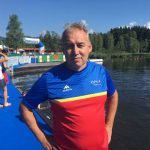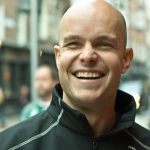Program
*Training Peaks University Pre Conference Workshop*
Dec 4, 2017 08:30
08:30TrainingPeaks University is a workshop designed to help you use TrainingPeaks more efficiently in order to save time and grow your business
By Conference
Day 1
Dec 5, 2017- We welcome you to the Sci + Tri Conference - and get your head-spinning from the get-go at Edmonton's World famous rooftop revolving restaurant! Enjoy a welcome drink, pick up your registration package and mingle with other delegates. HIGHLY RECOMMENDED OFFER: Speed-networking! - Meet up to five people every 15 minutes (you'll get 3mins per person, so be ready to make an impression). This is widely proven way to quickly get familiar with the relevant connections you'll be making during the conference, and rapidly expand your professional contacts and relationships from the moment you arrive.SocialWhereChateau La Ronde - 10111 Bellamy Hill Edmonton
Day 2
Dec 6, 2017- Two different pace groups will go out for 30 – 45 minute runs (8 min/mile and 10 min/mile group). Be sure to dress in layers and bring mitts and toques. We will have a small fleet of demo shoes (spikecross – speedspikes) available on a first come, first serve basis at the Registration Desk.
- Last chance to pick up your registration package.
- On the main floor, next to the lobby, you will find the Café Lacombe where you can enjoy a Canadian Hot Breakfast Buffet and sit at one of the designated networking tables.SocialWhereCafé Lacombe
 09:15 - 09:45
09:15 - 09:45It’s gotta be the shoes: hype and reality in sports science
By Alex Hutchinson Author and JournalistFrom spring-loaded shoes to bioengineered sports drinks, sports science keeps making bigger promises about training and performance. But how do you distinguish evidence-backed research from pseudoscience and wishful thinking?Effective Learning Tools for InnovationPlenary 09:45 - 10:15
09:45 - 10:15Knowledge transfer: how to get the most out of scientific research when working with athletes
By Dr. Pierre-Nicolas Lemyre Professor and DirectorNow that we can evaluate research and determine it's legitimacy, how do we take this research and put it into practice: A How to Session on Knowledge TransalationEffective Learning Tools for InnovationPlenary- 10:15 - 10:30
Break
 10:30 - 11:15
10:30 - 11:15The Determinants of Performance and Participation in Sport
By Dr. Jean Côté Professor and DirectorJean Côté is a Canadian author who recently developed a conceptual model that incorporates the elements necessary for a developmentally sound approach to sport involvement; the Personal Assets Framework. The Personal Assets Framework includes three determinants that interact to create positive experiences in sport: 1) taking part in activities, 2) while entertaining relationships with others, 3) in a specific setting. Research that links the three basic elements of sport (activities, relationships, and settings) to positive changes in personal assets and long-term outcomes of athletes will be discussed in this presentation. Furthermore, practical implications will be offered to enhance the design of sport programs that are developmentally appropriate.Driving PerformancePlenary 11:15 - 12:15
11:15 - 12:15Gold Medalists Coaches
By Iñaki Arenal Spanish Triathlon Federation, Malcolm Brown Coach, British TriathlonThe session will discuss how Gold Medal Coaches address:- What sources of information do you find reliable? How do you develop a sport science team?
- What are some early indicators for identifying talent?
- How much time is spent on muscle strength, muscle endurance and neuromuscular fitness? Pre season / in season / off season
- At what point in the training season, is general fitness the highest?
- How do you address illness and injury among elite athletes – what are some rules of thumb for return to play?
Driving PerformancePlenary- 12:15 - 13:00
Lunch
 13:00 - 14:00
13:00 - 14:00A Tale of Two Dogmas, 10,000 Hours and One Flexible Strategy
By Dr. Ross Tucker Chief Scientist, World RugbyThe pathway that produces elite athletes is the focal point of many nations’ and teams’ high performance strategy. Identifying, and then managing the environment that develops a talented junior into a potential Olympic medalist or World champion is fundamental to sporting achievement, and is optimized in a number of different ways around the world. Recently, the issue has been polarized into two dogmas - a talent model, and a training model. In the talent model, popularized by a handful of recent best-selling books, it is proposed that talent is a myth, that all individuals share common genes, and that 10,000 hours of deliberate practice are necessary to activate these dormant genes in order to become elite. This has implications for age of initiation of sport, as well as specialization, and the overall design of our sporting systems from school to professional level. In this presentation Professor Ross Tucker will analyze the concepts put forward by this model, and describe how a rigorous and complete scientific understanding of elite sports performance, from genes, to daily training environments, reveals that often, doing the “right thing” is not necessarily the best thing, and what implications this may have for our strategic thinking about producing champions.Driving PerformancePlenary 14:00 - 14:45
14:00 - 14:45Moving Beyond Counting Hours: How to calculate stress on an Athletes body
By Dr. Carl Foster Professor & Director of ResearchThe realities of maximizing performance and adaptation without overtraining and overreaching. Dr. Carl Foster will discuss how to best understand training stress using both theory and the applied importance of periodizing plans. How to predict overreaching using the most scientific method of determining "training stress" as opposed to counting hours.Driving PerformancePlenary- 14:45 - 15:00
Break
 15:00 - 15:45
15:00 - 15:45Sustainable Motivation for Elite Athletes and Coaches
By Dr. Pierre-Nicolas Lemyre Professor and DirectorAthletes and coaches in elite sports share exceptional dedication, commitment and drive in order to achieve and deliver high-level of performances. Combining contemporary theories of motivation as well as two decades of sport psychology consulting experience, Dr. Lemyre will present a dynamic approach to sustainable motivation for elite athletes and coaches. Examples will be used to highlight the complex environment of elite sports and the opportunities for motivational interventions to promote optimal performance and prevent risks for exhaustion and other debilitating states in athletes and coaches.Optimizing Physical and Coaching PerformancePlenary 15:45 - 16:30
15:45 - 16:30Enhancing parent-coach interactions to maximise athletes' engagement and development
By Dr. Camilla Knight Associate Professor in Sports PsychologyThis session will explore the critical role of parents in facilitating athletes' motivation, perceived competence, and subsequent performance in sport. Further, this session will examine the importance of parent-coach interactions in ensuring parents are best involved in sport. Strategies for enhancing parent-coach interactions and facilitating the development of support relationships will be shared.Optimizing Physical and Coaching PerformancePlenary- Featuring: TritonWear / VO2 Master / Training PeaksDriving Performance
- Mark Pollock helps people achieve more than they thought possible. It is tough to deliver world class performance. Your people won’t do it by chance. With a high-impact catalyst you can help them act with the courage to make it happen. Mark Pollock is that catalyst. Unbroken by blindness in 1998, Mark went on to compete in ultra endurance races across deserts, mountains, and the polar ice caps including being the first blind person to race to the South Pole. He also won silver and bronze medals for rowing at the Commonwealth Games. In 2010 Mark was left paralysed after falling from a second story window. He is now exploring the frontiers of spinal cord injury recovery combining an innovative electrical stimulator over his spinal cord and a drug super-charging his nervous system whilst walking hundreds of thousands of steps as the world’s leading test pilot of Ekso Bionic robotic legs. Cocktail Reception: 18:00 Mark Pollock presentation: 18:30 Dinner to followKeynoteSocial
Day 3
Dec 7, 2017- Two different pace groups will go out for 30 – 45 minute runs (8 min/mile and 10 min/mile group). Be sure to dress in layers and bring mitts and toques. We will have a small fleet of demo shoes (spikecross – speedspikes) available on a first come, first serve basis at the Registration Desk.
- On the main floor, next to the lobby, you will find the Café Lacombe where you can enjoy a Canadian Hot Breakfast Buffet and sit at one of the designated networking tables.Social
 09:00 - 09:45
09:00 - 09:45Updates and current evidences of altitude training effectiveness
By Dr. Grégoire Millet Professor of Exercise PhysiologyDr. Grégoire Millet will discuss the use of altitude exposure to enhance endurance performance. He will provide you with a further understanding of the potential benefits and risks.BreakoutEnvironmental Risks in Training 09:45 - 10:30
09:45 - 10:30Adapting to Training and Competing in the Heat
By Dr. Stephen Cheung Professor KinesiologyMany sports are conducted in warm to extremely hot temperatures, which can lead to both reduced performances and increased risk to athlete health. Progressive adaptation to higher heat loads via laboratory acclimation or natural exposure (acclimatization) can provide substantial potential for improved performance. Heat adaptation may include reductions in resting core temperature and heart rates, increased resting plasma volume, and habituation resulting in reduced thermal discomfort. In addition, a higher sweat rate – especially from a lower core temperature threshold for sweating onset – results in a greater evaporative heat loss capacity. These responses may each have different thresholds of stimulus duration and intensity for maximal effect. Furthermore, each may have its own timeline for onset and decay. This talk will also survey the logistical and training modifications that may be required to optimize response.BreakoutEnvironmental Risks in Training- 10:30 - 10:45
Break
 10:45 - 11:30
10:45 - 11:30Training and Competing in a Polluted Environment
By Dr. Michael Koehle Physician & Associate ProfessorWe will discuss the health risks associated with high air pollution levels, and then discuss the evidence around exercising in air pollution. The session will conclude with some recommendations on how to best mitigate the risks when training and competing in a polluted environment.BreakoutEnvironmental Risks in Training 11:30 - 12:15
11:30 - 12:15Exercise and Your Heart: How Much is Too Much?
By Dr. Jack Goodman Professor & ScientistThis session will address the controversial claims that intensive exercise training may lead to adverse effects on the heart, summarize our understanding of how it adapts to training and what ‘abnormal findings’ merit concern or simply reflect harmless adaptations common to the ‘Athletic Heart Syndrome’.Medical Consequences of Training- 12:15 - 13:00
Lunch
 13:00 - 13:15
13:00 - 13:15What is FutureProofing? What are the biggest threats to the athletes competing in Triathlon?
By Dr. Pierre-Nicolas Lemyre Professor and Director- With Dr. Vicki HarberFuture Proof
- With Dr. Vicki HarberFuture Proof
 13:30 - 14:00
13:30 - 14:00Roundtable on Training Stress – how to monitor training load, progressive overload to provide a healthy training program
By Conference , Dr. Grégoire Millet Professor of Exercise Physiology, Dr. Stephen Cheung Professor Kinesiology, Alex Hutchinson Author and Journalist, Dr. Carl Foster Professor & Director of Research, Malcolm Brown Coach, British TriathlonAlso featuring Dave SchellFuture Proof 14:00 - 14:30
14:00 - 14:30Roundtable on Medical Consequences of Training – What are the risks and consequences that need to be addressed to improve the welfare and performance of triathletes?
By Conference , Dr. Grégoire Millet Professor of Exercise Physiology, Dr. Michael Koehle Physician & Associate Professor, Dr. Jack Goodman Professor & Scientist, Dr. Carl Foster Professor & Director of ResearchAlso featuring Dr. Doug HillerFuture Proof- 14:30 - 14:45
Break
 14:45 - 15:15
14:45 - 15:15Roundtable on Developing Talent – How can we harness the collective knowledge of healthy youth development in Sport to improve participation and excitement in future generations of adult triathlete
By Conference , Dr. Pierre-Nicolas Lemyre Professor and Director, Dr. Camilla Knight Associate Professor in Sports Psychology, Dr. Jean Côté Professor and DirectorAlso featuring Kevin Clark, Erin Densham & Dr. Vicki HarberFuture Proof 15:15 - 15:45
15:15 - 15:45How can Federations help set their athletes up for success and affect change at the Federation level?
By Conference , Iñaki Arenal Spanish Triathlon FederationAlso featuring Dr. Debbie Alexander, Loreen Barnett, Marisol Casado, Shin Otsuka, Sergio Santos, Barry SiffFuture Proof
Day 4
Dec 8, 2017- 10:00 - 10:30
Group bus departs to the Rocky Mountains


